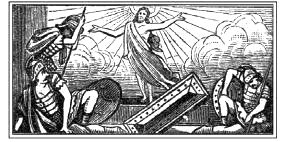
| Contents | Iste, quem laeti He, whom the faithful joyously do honor |
Ioseph |

Written by Fr. Juan Escollar (d. 1700), this hymn was formerly used at Lauds for the feast of St. Joseph, Husband of the Blessed Virgin Mary (March 19). It is still used for this feast, but for the Office of the Readings. It is also the hymn for the Office of the Readings for the Feast of St. Joseph the Worker on May 1.
|
| ISTE, quem laeti colimus, fideles cuius excelsos canimus triumphos, hac die Ioseph meruit perennis gaudia vitae. |
HE, whom the faithful joyously do honor, singing his praises with devout affection, won on his feast day, in eternal glory life everlasting. |
| O nimis felix, nimis o beatus, cuius extremam vigiles ad horam Christus et Virgo simul astiterunt ore sereno. |
Blest beyond others, and exceeding blissful, for when the moment of his death was nearing, Jesus and Mary at his side were standing, soothing his spirit. |
| Iustus insignis, laqueo solutus 1 carnis, ad sedes placido sopore migrat aeternas, rutilisque cingit tempora sertis. |
Death he doth conquer, laying down his burden calmly he slumbers, rest he gains eternal; lo, round his forehead, bright with rays of splendor shineth a garland. |
| Ergo regnantem, flagitemus omnes, adsit ut nobis, veniamque nostris obtinens culpis, tribuat supernae munera pacis. |
Then, as he reigneth, earnestly beseech we that he may utter fervent intercessions, praying that pardon and the peace of heaven may be our portion. |
| Sint tibi plausus, tibi sint honores, Trine qui regnas Deus, et coronas aureas servo tribuis fideli omne per aevum. Amen. |
Glory we give Thee, hymns of praise and blessing, One in Three Persons, who above art reigning, God, who hast honored with Thy crown forever this Thy true servant. |
| From the Liturgia Horarum. Translation by Canon Winfred Douglas (1867-1944) et al. 1 Older Breviaries show this line as: Hinc stygis victor, laqueo salutus.. |
<- Prev |
Next-> |
